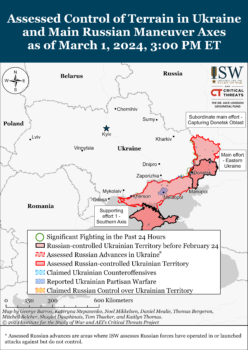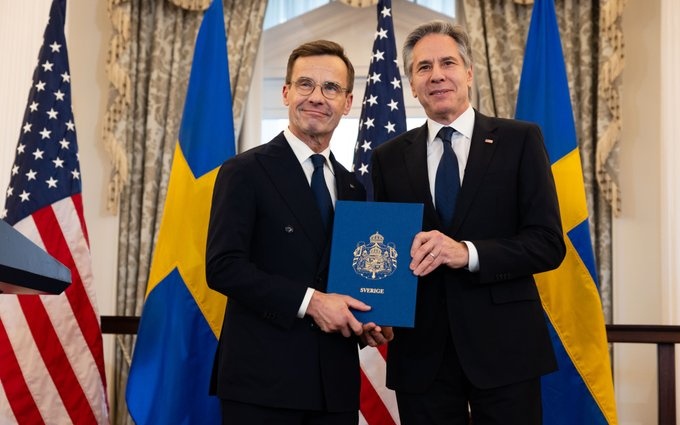Swedish Prime Minister Ulf Kristersson (L) and US Secretary of State Antony Blinken with Sweden’s instrument of accession to NATO, Washington, DC, March 7, 2024
Thursday’s Coverage: Russia’s Missile Kills 5 in Odesa, Close to Zelenskiy and Greek Prime Minister

Map: Institute for the Study of War
UPDATE 1736 GMT:
Ukraine President Volodymyr Zelenskiy has met Turkish counterpart Recep Tayyip Erdoğan in Ankara.
Zelenskiy thanked Erdoğan and “all Turkish and Ukrainian defense companies for their partnership and for working together to bring peace closer and make it a lasting one”.
Visit to Türkiye. Istanbul. Shipyards where corvettes are built for our Navy. I inspected the readiness and equipment of the Ivan Mazepa corvette and spoke with Ukrainian Navy personnel. I thanked them for their service. We are strengthening our country.
I also inspected the… pic.twitter.com/aZmR94icRQ
— Volodymyr Zelenskyy / Володимир Зеленський (@ZelenskyyUa) March 8, 2024
UPDATE 1348 GMT:
Two civilians were killed and 26 wounded in a Russian missile attack on Sumy in northern Ukraine on Thursday.
A school, the central city hospital, the regional emergency medical care centre, and the water utility were damaged.
UPDATE 1104 GMT:
Ukraine air defenses downed 33 of 37 Iran-type attack drones fired by Russia overnight.
The UAVs were intercepted over the Kirovograd, Odesa, Kherson, Nikolaev, and Kharkiv regions.
The Russians also launched one S-300 and two X-59 missiles.
In the Odesa region, an infrastructure facility, which had been “mothballed for a long time”, was struck by a drone. A fire was quickly extinguished, and there were no reports of casualties.
UPDATE 1058 GMT:
Ukraine’s Presidential Chief of Staff Andriy Yermak has hosted a delegation headed by Li Hui, the Chinese Government’s special representative for Eurasian affairs.
Held a briefing on the security situation in and other topical issues for the delegation of the headed by Li Hui, Special Representative of the Government for Eurasian Affairs. pic.twitter.com/vSEPHQIMWW
— Andriy Yermak (@AndriyYermak) March 8, 2024
On Thursday, Foreign Minister Wang Yi reiterated China’s calls for peace negotiations between Russia and Ukraine. He said Beijing will maintain an objective and impartial position on the Russian invasion.
Li Hui had met Russia’s Deputy Foreign Minister Mikhail Galuzin in Moscow last Saturday, discuss the Chinese desire to arrange peace negotiations. Galuzin and Li agreed that it is “impossible” to discuss a settlement in Ukraine without Russia’s participation and without “taking into account [Russia’s] interests in the security sphere”.
UPDATE 1046 GMT:
As Ukraine President Volodymyr Zelenskiy meets Turkey’s officials — including Turkish counterpart Recep Tayyip Erdoğan — in Istanbul on Friday, Turkey’s main transshipment terminal, Dörtyol, is refusing to handle Russian oil.
Located on the Mediterranean coast of the country, Dörtyol received record volumes of Russia’s oil in 2023. But Global Terminal Services announced on Tuesday that it will no longer accept cargo from Russian shippers.
“Even in the absence of a violation of any laws, regulations or sanctions, the company will not accept products of Russian origin or products shipped from Russian ports as an additional measure to the current sanctions rules,” GTS said. The company said a notice was sent to customers in late February.
The last tanker with Russian fuel arrived in Dertyol on February 19, delivering 511,000 barrels of diesel fuel from Primorsk.
The Dörtyol terminal handled 11.74 million barrels of Russian crude in 2023, seven times its total from all shippers in 2021.
After Vladimir Putin’s invasion of Ukraine, Turkey tripled its purchases of Russian oil. At their height, in fall 2023, Russian exports to the Turkish market exceeded 400,000 barrels per day.
By January, the volume had fallen to 200,000 barrels per day.
UPDATE 0839 GMT:
In his nightly address to the nation, Ukraine President Volodymyr Zelenskiy hailed Sweden’s accession to NATO. He echoed Swedish Prime Minister Ulf Kristersson, “We are always stronger when we are together.”
One more European country is now better protected from Russian evil. Sweden is joining NATO.
Everyone benefits when one country's security improves and that country can truly strengthen shared security. This rule has consistently worked throughout NATO's existence, and I am… pic.twitter.com/yh6HcVXIJq
— Volodymyr Zelenskyy / Володимир Зеленський (@ZelenskyyUa) March 7, 2024
UPDATE 0826 GMT:
Ukraine President Volodymyr Zelenskiy has appointed Gen. Valerii Zaluzhnyi, the former commander-in-chief of the Ukrainian military, as Kyiv’s Ambassador to the UK.
Zelenskiy dismissed Zaluzhnyi last month. The President said at the time that he wanted the general to remain “as part of the team”, and there was speculation that this might be through a prominent ambassadorial post.
UPDATE 0817 GMT:
A Russian missile strike has injured at least seven people, including a 3-year-old girl and a 16-year-old boy, in Chuhuiv in the Kharkiv region in northeast Ukraine.
S-300 missiles damaged a nine-story residential building, a shopping mall, a bank, a shop, and a hotel early Friday.
Three people were killed amid Russian attacks on 18 settlements in the region on Thursday.
The victims were a 64-year old woman, a 58-year old man, and a 40 year old woman. Two were in Kupyansk near the frontline and one in Vovchansk.
UPDATE 0810 GMT:
Under a decree signed by Ukraine President Volodymyr Zelenskiy, conscripts who have fought against Russia’s invasion since February 2022 will be discharged into the reserves within the next two months.
Those discharged will be exempt from further mobilization for 12 months.
ORIGINAL ENTRY: Sweden has officially become the 32nd member of NATO.
Stockholm’s membership was confirmed late Thursday morning in Washington. The “instrument of accession” was officially deposited at the US State Department, in a ceremony led by Swedish Prime Minister Ulf Kristersson and Secretary of State Antony Blinken.
Kristersson posted:
Sweden is now a NATO member. Thank you all Allies for welcoming us as the 32nd member. We will strive for unity, solidarity and burden-sharing, and will fully adhere to the Washington Treaty values: freedom, democracy, individual liberty and the rule of law. Stronger together.
— SwedishPM (@SwedishPM) March 7, 2024
Blinken added, “Sweden is stronger and safer within the alliance, and NATO is stronger and safer with Sweden as an ally.”
Sweden’s
Both countries formally applied in April 2023. Helsinki joined in April 2023, after Turkish Prime Minister Recep Tayyip Erdoğan withdrew his objection. However, Ankara continued to seek leverage over Sweden’s Kurdish population, and Hungary Prime Minister Viktor Orbán — a long-time ally of Vladimir Putin — put up barriers.
See also “Never Again Alone”: Finland’s Path to NATO
The Turkish Parliament approved Swedish accession in January. Isolated in his opposition, Orbán finally gave way last week.
NATO Secretary General Jens Stoltenberg said in a statement:
This is a historic day. Sweden will now take its rightful place at Nato’s table, with an equal say in shaping Nato policies and decisions.
After over 200 years of non-alignment, Sweden now enjoys the protection granted under Article 5, the ultimate guarantee of allies’ freedom and security.
It’s official – #Sweden is now the 32nd member of #NATO, taking its rightful place at our table. Sweden’s accession makes NATO stronger, Sweden safer, and the whole Alliance more secure. I look forward to raising their flag at NATO HQ on Monday.
— Jens Stoltenberg (@jensstoltenberg) March 7, 2024
In a televised address from the Swedish Embassy in Washington, Kristersson told the nation that Sweden had become “a safer country than we were yesterday”.
He reassured opponents to the accession by portraying a natural conclusion to a long journey where Sweden’s security was connected to that of the world.
“Alone isn’t strong,” he explaining, closing with “one for all, all for one” and a “new epoch for Sweden”.
The military significance of the moment was marked this week with the inclusion of Sweden and Finland in NATO’s training exercise Nordic Response a first-of-its-kind military training exercise that includes Sweden and Finland, began across the region, involving more than 20,000 soldiers.
On Wednesday, two American bombers escorted by Swedish fighter planes flew over Stockholm and Uppsala in a joint exercise in the middle of the day – a highly symbolic moment for a country with a long tradition of neutrality.
Sweden recently signed a deal giving the US full access to 17 of its military bases and announced plans to send its forces to Latvia.

